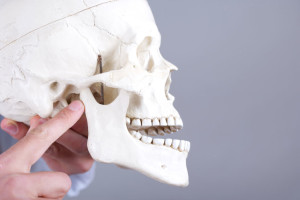 The temporomandibular joint is the what connects your lower jaw to your skull. If your teeth are allowed to move within your jaw, that can affect your bite. This can be triggered by the loss of a tooth, orthodonture work, or even something like tooth grinding at night. Your TMJ is constantly being used and can be a source of frequent discomfort and even pain. We at OMSH take pride in helping those who are suffering from frequent TMJ pain to achieve a solution that fits their lifestyle.
The temporomandibular joint is the what connects your lower jaw to your skull. If your teeth are allowed to move within your jaw, that can affect your bite. This can be triggered by the loss of a tooth, orthodonture work, or even something like tooth grinding at night. Your TMJ is constantly being used and can be a source of frequent discomfort and even pain. We at OMSH take pride in helping those who are suffering from frequent TMJ pain to achieve a solution that fits their lifestyle.
TMJ Fatigue and Pain
The TMJ is one of those joints that we take for granted all the time. Quite frequently throughout our day we are talking or chewing food, and very often our mouth is still working away involuntarily. Many people are even putting their TMJ to work at night without even knowing it! Teeth grinding (AKA Bruxism) is an activity that a large portion of the population engages in, that can have a severely adverse effect on our teeth and TMJ.
What causes TMJ fatigue?
With all these factors at work, it is no wonder that the TMJ will occasionally act up or become a point of fatigue. One of the biggest factors affecting TMJ pain is when your bite changes. Consider your bite and how complex it is. For your jaw to sit at rest all of your teeth have to align perfectly – that’s no simple task.
Each one of your molars has several peaks and valleys on the biting surface that has to fit into the peaks and valleys on the biting surface of the opposing teeth. That’s roughly 32 teeth that are intricately patterned that must fit into each other just right. If one of those teeth is even slightly off it stands a good chance of bumping a tooth on the opposing jaw before the rest of your teeth have a chance to close entirely. That one tooth being out of place may sound like nothing to lose sleep over but for your TMJ it can have a big impact.
Consider the impact that a popcorn kernel has on your bite. If you get a popcorn kernel stuck between your teeth it can feel like you have a huge piece of food stuck in there! Once you get it out it’s almost always underwhelming. Why is that? A slight change in the way your teeth fit together has a massive impact on your bite and your TMJ.
When your bite is off you will find your jaw constantly looking for a comfortable place to rest. It will never find that place because your bite is off. What ends up happening is your TMJ works and works toward an end that it can’t achieve. The muscles in your jaw end up being over-worked, and become fatigued because of it.
How to Solve TMJ Fatigue and Pain
We have a number of solutions to the different causes of TMJ fatigue. Depending on what events lead up to the fatigue of your TMJ we can prescribe the correct method of treatment.
When TMJ fatigue is brought on by a change in bite due to dental work, we will do our best to make the changes to your teeth to bring your bite back to the correct place. Sometimes when we place a new appliance in your mouth (like a crown or a bridge) it won’t fit exactly right, and will need some fine tuning in order to fit in to your bite. If you have some dental work done and find that you experience difficulty closing your teeth all the way, please call us and schedule an appointment and we will be happy to make any alterations necessary to make you feel comfortable.
If you grind your teeth at night, that puts you at risk not only for TMJ fatigue but also chipping and cracking teeth. If you believe you grind your teeth at night, please schedule an appointment with us so that we can evaluate what may be going on. If we find signs that you are grinding your teeth at night, we will give you the option of having a night guard (AKA Occlusal Splint) fitted. A night guard will protect your teeth from nocturnal grinding and allow the fatigue in your jaw to melt away.
Please contact us to schedule your no obligation consultation today.
